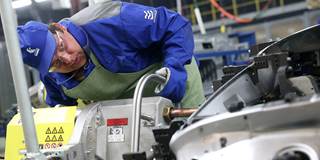Artificial intelligence researchers and conventional economists may have very different views about the impact of new technologies. But right now, and forgetting the possibility of an existential battle between man and machine, it seems quite plausible to expect a significant pickup in productivity growth over the next five years.
CAMBRIDGE – Most economic forecasters have largely shrugged off recent advances in artificial intelligence (for example, the quantum leap demonstrated by DeepMind’s self-learning chess program last December), seeing little impact on longer-term trend growth. Such pessimism is surely one of the reasons why real (inflation-adjusted) interest rates remain extremely low, even if the bellwether US ten-year bond rate has ticked up half a percentage point in the last few months. If supply-side pessimism is appropriate, the recent massive tax and spending packages in the United States will likely do much more to raise inflation than to boost investment.

CAMBRIDGE – Most economic forecasters have largely shrugged off recent advances in artificial intelligence (for example, the quantum leap demonstrated by DeepMind’s self-learning chess program last December), seeing little impact on longer-term trend growth. Such pessimism is surely one of the reasons why real (inflation-adjusted) interest rates remain extremely low, even if the bellwether US ten-year bond rate has ticked up half a percentage point in the last few months. If supply-side pessimism is appropriate, the recent massive tax and spending packages in the United States will likely do much more to raise inflation than to boost investment.